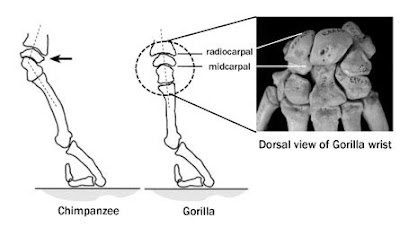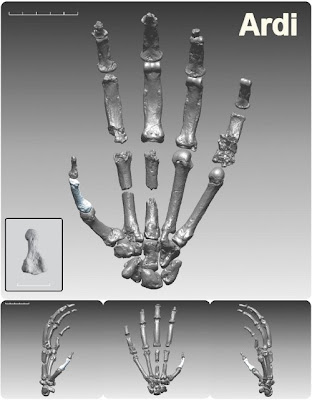Wednesday, October 28, 2009
Ardi Video Mining
Creationism, in all its many guises, is a religious belief. Genesis comprises an internally inconsistent, allegorical creation-myth. Biblical literalists seem incapable of reconciling their emotional needs for priveleged status with the realities of inconsistent scriptures packed with errors. Because several areas of science falsify biblical metaphysics, creationists rely upon ignorance, misinformation (aka lies), and a variety of fallacies of logic to protect their precious delusions.
This video includes yet another lie from the comedy duo of Bananaman Ray Comfort and Failed Actor Kirk Cameron. Attacks on science substitute for the evidence that is glaringly missing from creationist claims. To assume that ridiculing scientific evidence renders creationism correct is to rely upon a fallacious argument from ignorance. This pathetic tactic highlights the intellectual poverty of the creationist position. Note, intellectual poverty does not prevent charlatans from making lots of money by peddling lies to the deluded.
For comparison:
Hand over Wrist
All the better to climb trees with
The video segment is from the following:
http://www.youtube.com/watch?v=CQQ6UCfijyc
The complete documentary on the discovery of Ardipithecus ramidus is here:
Playlist:
http://www.youtube.com/view_play_list?p=A033F703945B67EE
Ardipithecus is a very early hominin genus (subfamily Homininae). Two species are described in the literature: A. ramidus, which lived about 4.4 million years ago during the early Pliocene, and A. kadabba, dated to approximately 5.6 million years ago (late Miocene).
http://en.wikipedia.org/wiki/Ardipithecus
http://en.wikipedia.org/wiki/Lucy_(Australopithecus)
The Hominidae (anglicized Hominids, also known as great apes) form a taxonomic family, including four extant genera: chimpanzees, gorillas, humans and orangutans.
http://en.wikipedia.org/wiki/Great_ape
http://en.wikipedia.org/wiki/Knuckle-walkinghttp://www.sciencenews.org/view/generic/id/46246/title/Humanity%E2%80%99s_upright_gait_may_have_roots_in_treeshttp://www.sciencenews.org/view/access/id/46249/title/bb_knuckle_walking.jpg
Humans share ~98 % of DNA sequences with our nearest relatives, the common chimpanzee (Pan troglodytes).
http://en.wikipedia.org/wiki/Chimpanzee
Hand over Wrist





Thursday, October 1, 2009
INP atheist bloggers - ESF church goers

With regard to dogmatism (a feature of Republicans and the religious):
"A sample of 422 female undergraduate students, attending a university-sector college in Wales specialising in teacher education and liberal arts subjects, completed the Myers-Briggs Type Indicator together with the Troldahl-Powell Dogmatism Scale. The data demonstrated that higher dogmatism scores are most clearly associated with sensing rather than intuition. Higher dogmatism scores are also associated with extraversion rather than introversion, and with judging rather than perceiving. No significant difference in dogmatism scores were found between thinking and feeling."
Source:
Dogmatism, Religion, and Psychological Type, Christopher F. J. Ross, Leslie J. Francis and Charlotte L. Craig, Pastoral Psychology, Volume 53, Number 5 / May, 2005
That is, ESJ types are indeed more likely to be dogmatic. It's interesting that there was no significant difference in dogmatism between self-reports of T versus F.
E/I : extroversion vs introversion – outgoing, energized by social interaction vs introspective and fatigued by too much socializing.
S/N : sensing vs intuitive – satisfaction with the basic information (S) vs a tendency to search for cognitive insights based upon that information (N).
F/T : feeling vs thinking – self-perception of basing of decisions upon 'gut'-level intuitions and feeling (F) vs basing of decisions on logic and rationality (T).
J/P : judging vs perceiving – a preference for closed-ended structure and quick decisions (J) vs a desire to keep options open and to seek more information before making decisions (P).
Because the inventory is administered by fee-charging professionals who purchase it from the developers, it is not available on-line. However, it is not too difficult to quickly guesstimate where you – and your family and friends –would place on the inventory. This page has a chart with roll-over descriptions of each combination.
The four parameters yield 16 different combinations. Though many mental health professionals might treat these combinations as cut-and-dried, there are shades of gray to these parameters – for example, you might consistently base some types of decisions on feelings and other types of decisions on logic.
Information adapted from here.
Dis-information Explosion

Any fool — and this could include yours truly — can now publish their ramblings on the Internet. Any fool can find, courtesy of content-blind search engines, some emotionally appealing theory that fits their prejudices and sneaks past their lack of logic and/or knowledge. The problem, of course, is that few fools, as Giorgio W. Borgia illustrates, know that they are fools.
Once upon a time, editors of peer-reviewed scientific journals determined what information was valid in scientific fields. Nowadays, a proliferation of religiously-biased pseudoscience is foisted onto an already science-ignorant society that lacks sufficient acumen to determine that most of the supposed uncertainty surrounding science has been manufactured to suit religious ends. This is not to say that science has all the answers, but it is to say that denying scientific facts does not constitute evidence that science has found few valid explanations.
Most scientists – Michael Behe is an egregious exception – have not sold out to biased philosophical pretentions that claim to represent genuine science. However, religiously oriented websites and internet trolls abound to glorify creationinsts and promote anti-educational sentiments.
Agnosticism is LESS rational than Atheism

I guess what I’m saying is that, out of respect for the rather large majority of thinking, reasoning, good human beings who believe, I’m willing to go to greater lengths to keep my mind open about the existence of a personal God than that of the Flying Spaghetti Monster. I think the collective belief of millions adds up to evidence that I’m willing to consider despite the fact that it’s not empirical."[s]
Response: Courtesy is fine, but being courteous is not an argument for agnosticism over atheism. The fact that the Judeo-Islamo-Christian God has prospered over unicorns and Flying Spaghetti Monsters speaks only to The Clerical Publicity Machine and is not an argument for the existence of the purported deity claimed by that machine. It’s a fallacious “argument to popularity” to hold that the fact that many have been taught to believe in this Judeo-Islamo-Christian conception signifies that the teachings are valid.
If the prevailing publicity structure had instead insisted upon the existence of the Great Unicorn in the Sky, on which we would all Ride to Heaven, then priests (presumably adorned with uni-horned hats) would be extolling the virtues of this Mythical, Supernatural, All-Loving Creator of Humans.
On the basis of logic alone, it could be argued that the agnostic view, which holds that it simply is not knowable whether or not whatever deity exists, is more philosophically rigorous than stating that there is no God.
However, certain *falsified* falsibiable creation claims are made about the Judeo-Islamo-Christian God, so the *falsification* of these claims renders Atheism the most rational conclusion. By corollary, other creation mythologies, as well as the practical need for interventionist deities are falsified by the same scientific findings.
Agnostics resort to Humean skepticism in their arguments that take the position that absolute uncertainty is impossible, so agnosticism is the only correct stance. This argument is problematic. It ignores the original meaning of agnosticism, substituting a circular definition that relies upon the impossibility of absolute certainty. Whatever baseline degree of uncertainty obtains, the same base level applies to all epistemic enquiries. However, not all knowledge is equally uncertain, so it is not useful to tar all understanding with the same brush.
Further, if , at minimum, an uninvolved creator deity existed, then that deity has interacted with the physical world and, so, is necessarily physical. It follows that there ought to be evidence for a deity. The so-called supernatural was invented in order to remove the non-evidence for a deity as far from refutation as possible. Although it would be dissonant for theists and deists to admit that evidence should exist, the apologetic necessity for a supernatural excuse points supports the positive conclusion that no deity exists.
I grow tired of being polite to people merely because they have been brainwashed into collective belief in a non-existent, demanding, invented deity.
From here.
IQ Up, Religiosity Down

This comment was posted on a website where an inverse correlation between verbal IQ and religiosity was discussed.
My experience suggests several things: higher verbal IQ scores result from interaction of genetic cognitive potential with education, which in turn forces more logical approaches, which in turn reduces religiosity. Since most Westerners are introduced to religious concepts when young, most agnostics and atheists have moved away from religious belief. I think that this directionality does suggest that intelligence (read as logic combined with education) precedes, and hence causes, reduced religiosity.
"We all know that correlation does not necessarily indicated causation, though causation may be indirectly linked to the correlation."
Most people are not particularly logical, and those with little formal education are the least logical. Those people whom I have known who are both intelligent and religious typically have emotional issues that necessitate a comforting belief system. So, emotionality is a confounding factor, as are early indoctrination and community peer pressure. I think that to tease out the truth about the connection between religiosity and intelligence would require examining all the possible variables and not merely religiosity and verbal IQ."
There's a graph showing the U.S. compared to some wealthy nations and more links here.
Who knows what level of intelligence these folks possess? They ought to be embarrassed about singing such prejudiced, hateful material, but I'm certain that they will not. It is the typical error of those who band together in hatefulness to assume that they take the higher moral ground. This strikes me as one of the perks of religious fanaticism – guilt free obnoxiousness. Jesus would roll in his grave at what has become of his pleas for tolerance.






